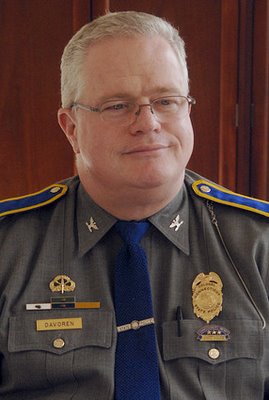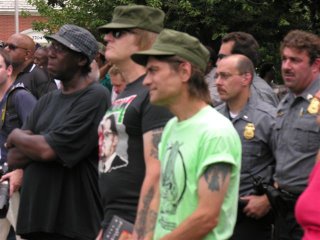Judges in Connecticut fear the Connecticut State Police
Sponzo, Ex-Judge, Dies At 92
Instrumental In '70s Reilly Homicide Case
June 24, 2007
By CHARLES STANNARD, Courant Staff Writer
Retired Judge Maurice J. Sponzo, whose 1977 investigation as a one-man grand jury cleared Peter Reilly in the highly publicized Litchfield County homicide case, died Wednesday. The Simsbury resident was 92.
In December 1976, Judge John A. Speziale, who later served as chief justice of the state Supreme Court, appointed Sponzo to investigate possible police misconduct in the arrest and prosecution of Reilly for the September 1973 slaying of his mother, Barbara Gibbons, in the rural western Connecticut town of Falls Village.
Reilly, who was 18 at the time, confessed to the slaying after lengthy interrogation by state police and was later convicted of first-degree manslaughter. Reilly recanted the confession while serving a six- to 16-year prison sentence, and his claim of innocence drew support from celebrities such as author William Styron, playwright Arthur Miller and movie director Michael Nichols.
New evidence in the case surfaced in the summer of 1976 in statements from an auxiliary state trooper and his wife that they had seen Reilly driving his car in Canaan at the time of his mother's killing at her home in Falls Village.
The information led to the dismissal of charges against Reilly and the subsequent appointment of Sponzo as a one-man grand jury. Sponzo's report, issued in June 1977, cleared Reilly and criticized state police and Litchfield County prosecutors for focusing on Reilly without investigating other possible suspects.
Reilly, reached Saturday at his home in Tolland, said he was sorry to learn of Sponzo's passing.
"He was a very fair man who ran a very thorough investigation of the case," Reilly said. Now 50, Reilly said he is "back on the job market" while taking care of his elderly adoptive parents, Mickey and Marion Madow.
A Hartford native, Sponzo began practicing law in 1940 after graduating from the University of Connecticut School of Law. He was serving as Chief Court Administrator for the state Judicial Department when he retired in 1984.
Sponzo was a World War II veteran, serving in the Pacific Theater with the 81st Infantry "Wildcat" Division. He left the service with the rank of captain in 1946 and worked as a prosecutor with the West Hartford Town Court. He served as corporation counsel for West Hartford from 1956 to 1959.
Sponzo was appointed as a circuit court judge in July 1967, continuing as a judge for the Court of Common Pleas and state Superior Court until 1979. He was named as the chief court administrator in 1981.
Sponzo's daughter Marilyn said her father's dedication to justice in the Peter Reilly case was only the most widely known example of the integrity and values he practiced through a 40-year legal career.
"He was an incredibly thoughtful and generous man who really instilled strong values in us," she said, adding that Sponzo was very proud to be a World War II veteran.
Marilyn Sponzo, a Granby resident, said her father's dedication to the law led her to pursue her own legal career as a securities lawyer. Sponzo's other daughter, Anne Sponzo Cappelli, also lives in Granby and works for the consumer credit division of the state Department of Banking.
Sponzo is also survived by two sisters, Rose and Theresa Sponzo of Farmington; a brother, Michael Sponzo of Avon; and two granddaughters. The funeral service is scheduled for Monday at 10 a.m. at St. Helena's Catholic Church, 30 Echo Lane, West Hartford.
Contact Charles Stannard at cstannard@courant.com.
* * * *
* * * *
Judge John A. Speziale questioned the ethics of the Connecticut State Police back in the 1970's. He then had to fear arrest and worse, as a judge. Judge Speziale allegedly made a deal to retire and keep quiet out of fear of the Connecticut State Police.
It has only gotten worse since then.
The Connecticut State Police go after anyone that questions their ethics, budget, or lodges a police misconduct complaint.
[click here] for a post on police Vendettas
This blogger's email: stevengerickson@yahoo.com
* * * *
The below from injusticebusters.com found here
Peter Reilly

In Tankleff case, some see shadows of a 1973 murder mystery
By John Springer, Court TV, Oct. 29, 2004
PORT JEFFERSON, N.Y. - In 1988, teenager Martin Tankleff confessed to murder after a few hours of finger-pointing, suggestions and even trickery by detectives investigating the brutal beating and stabbing of Tankleff's wealthy parents in their Long Island home.
It wasn't a bright-lights, TV-cop-show interrogation, but the questioning got police what they needed to make an arrest. Ultimately, Tankleff's self-incriminating statements and mild denials at his trial led to two second-degree murder convictions and a sentence of 50 years to life in prison.
"A normal person doesn't crack for something that he didn't do," a juror remarked.
To this day, Tankleff insists he was wrongly accused, coerced into confessing, and punished by a corrupt, self-preserving justice system that refused to go after people his lawyers call "the real killers."
Peter Reilly knows what that is like. The Connecticut man says the same thing happened to him.
"When I read about [the Tankleff case], I couldn't believe it," Reilly said recently. "It seemed almost identical to my case. It was almost like they just substituted the names. It was scary."
The similarities in the Tankleff and Reilly cases are striking.
Both were high-school seniors who summoned authorities to investigate murders in their home, quickly became suspects, gave confessions, recanted them and were convicted.
In Reilly's case, the victim was his mother, 51-year-old Barbara Gibbons. On Sept. 28, 1973, Reilly found her severely battered body on the floor of their cottage in Canaan, Conn., after returning home from a church youth meeting. Gibbons had been sexually mutilated and nearly decapitated.
Connecticut state troopers immediately found Reilly's demeanor odd, and he was whisked away by detectives for questioning. A failed polygraph examination solidified investigators' belief that Reilly attacked his mother, and they used the lie detector's findings as a hammer during an eight-hour interrogation.
Reilly eventually adopted their suggestion that he may have blacked out and attacked Gibbons. Later, the defense argued that the confession was the product of police manipulation and brainwashing.
A jury convicted Reilly of first-degree manslaughter in April 1974, despite a strong showing of community support and charges that overzealous detectives overlooked key evidence - including Gibbon's missing wallet and $100 from a check she had cashed that day - that pointed to someone other than Peter Reilly.
Reilly was finally exonerated after it was disclosed that prosecutors improperly withheld an auxiliary trooper's statement that placed Reilly far from the crime scene at about the time police said he was attacking his mother. A judge concluded that "a grave injustice" had been committed and vacated the conviction with prejudice, meaning Reilly could never be retried for the still-unsolved crimes.
Two cases coincide
Reilly, now 49 and living with a Connecticut family who took him in after he was accused, recently signed an online petition started by Martin Tankleff's long and growing list of supporters. The petition drive coincides with a hearing in which Tankleff's lawyers are presenting evidence of other culprits in his parents' murder.
"[Martin Tankleff] has obviously been in much longer than I was," said Reilly, who was released on appeal bond after his conviction and never went to back prison. "He's sitting there and we're hearing evidence about these characters. I felt I had to say something. It's starting to walk and quack like a duck."
State police in Connecticut are clinging to their belief that Reilly killed his mother, regardless of the judicial finding. Similarly, prosecutors in Suffolk County, N.Y., are working to protect their convictions against Tankleff, who stood to inherit his adopted parent's estate of an estimated $3 million had he been acquitted.
"I am amazed by the relationship to the Reilly case," said independent journalist and author Donald Connery, who is waging a court battle in Connecticut to get decades-old police records released.
"As in the Reilly case, the circumstances in the original investigation, the crime scene activity, the confession and how that was obtained - common sense tells you that it is ludicrous that Marty would have done the murders," Connery said. "I think it is a clear false confession case."
Assistant Suffolk District Attorney Leonard Lato said he was not familiar with the Reilly case, which is the most often cited case in books and articles about interrogation tactics that can yield false confessions. He declined further comment, noting only that he believes the Tankleff case isn't a false-confession case.
Retired homicide detective James McCready, who got Tankleff to incriminate himself by falsely telling him that Seymour Tankleff had come out of his coma and implicated the son, said he was only "vaguely" familiar with the Reilly case and couldn't comment. McCready still maintains that Tankleff killed his parents and offered a "Could I have blacked out?" confession only because he believed his father survived the attack and that he wouldn't be getting away with murder.
Although the judge, detectives and elected district attorneys involved in the Tankleff case in its early days have all either retired or moved on to other things, supporters of Tankleff, like Reilly, believe that the current prosecutors know an innocent man is in prison, but either don't care or fear that admitting a mistake would somehow undermine their efforts in other prosecutions.
"They would rather leave someone innocent in jail than, God forbid, have the public image that they might have made a mistake," Reilly said.
Marianne McClure, the sister of murder victim Arlene Tankleff, expressed a similar opinion in an online petition that will be sent to New York governor George Pataki requesting his personal intervention in the case.
"We are all becoming dreadfully fearful that this judge is part of the 'old boys' network' and will rule against Marty in what is a blatantly obvious miscarriage of justice," McClure wrote, referring to the judge overseeing the evidentiary hearing which began July 19.
"Please do not underestimate the passion with which we all feel about this case and Marty," McClure wrote further. "It will never go away, and I feel the strength of my sister, Arlene, to keep me going until my last breath is drawn as well."
The hearing on new evidence in the Tankleff case resumes Dec. 6 in Riverhead, N.Y.
Reilly is expected to be back in a New Britain, Conn., courtroom next month to support an effort to bring all of the police records pertaining to his mother's unsolved murder to light.
Tankleff kin seek Spota removal
BY ZACHARY R. DOWDY, STAFF WRITER, NY Newsday, October 20, 2004
Martin Tankleff's family Tuesday urged the state's highest elected officials -- and the public -- to help remove Suffolk District Attorney Thomas Spota from the hearing they hope will free him.
"A young man was wrongfully convicted of a crime and it appears the district attorney is doing everything in his power to uphold a wrongful conviction," said Ron Falbee of Westbury, Tankleff's cousin. "We believe ... we have murderers walking around Suffolk County."
Falbee and several other relatives of the man convicted in 1990 of killing his parents held a news conference at The Inn at Great Neck Tuesday to urge the top elected leaders in the state and Suffolk County to urge Spota to step down from his role in the hearing, and to remove him if he doesn't.
They also launched a drive to get support for their campaign by asking the public to sign online and paper petitions.
Tankleff's attorneys have filed two unsuccessful motions to have Spota removed.
Specifically, the family is calling on Gov. George Pataki to appoint a special prosecutor, saying that Spota's connections to key players in the case constitute conflicts of interest.
They also said they hope state Attorney General Eliot Spitzer intervenes by urging Pataki to act, and that U.S. Sens. Hillary Rodham Clinton, Charles Schumer, and Rep. Tim Bishop weigh in.
Spota has said he has no conflict of interest and it is his responsibility to continue handling the case.
Pataki's spokeswoman, Lynn Rasic, said the family's request is "under review." None of the other officials responded to calls for comment Tuesday.
In March 1996, Pataki removed Bronx District Attorney Robert Johnson from a high-profile murder case because the prosecutor would not pursue the death penalty.
Tankleff was convicted in 1990 of the Sept. 7, 1988, killings of his parents, Seymour and Arlene Tankleff of Belle Terre. Suffolk County Court Judge Stephen L. Braslow is presiding over an evidentiary hearing that could get him a new trial. Tankleff's attorneys, Bruce Barket of Garden City and Barry Pollack of Washington, have said the hearing is uncovering new evidence that could persuade a new jury to return a different verdict.
Several witnesses who have testified in the hearing, which started in July, have linked three other men to the murders.
One of those men, former bagel shop mogul Jerry Steuerman, was represented by Spota's former law firm partner, Gerard Sullivan, in a criminal case. Steuerman, a business partner of Seymour Tankleff, owed him hundreds of thousands of dollars at the time of the murders, and Martin Tankleff's lawyers have cited evidence in the hearings that they say shows Steuerman was involved. Steuerman has denied those allegations.
Steuerman's son, Todd Steuerman, was also represented twice by Sullivan, including in a 1983 drug case when Spota and Sullivan were partners. The case stemmed from charges Todd Steuerman sold cocaine at a store operated by his father.
In a 1993 assault case, Spota represented Det. James McCready, the Suffolk homicide detective who extracted on the day of the murders a confession Tankleff did not sign and later said was coerced.
"Marty Tankleff is an innocent young man who is paying the price for others' misdeeds," said Howard Asness, husband of Autumn Tankleff, who is Seymour and Arlene Tankleff's niece.
Copyright © 2004, Newsday, Inc.
In the Peter Reilly Case, Odd New Developments
By: Kathryn Boughton, January 30, 2004
In a move that state Freedom of Information Commission hearing officer Victor Perpetua likened to a scene from "Alice in Wonderland," State Police argued last week that they could not release files associated with the infamous Peter Reilly murder case from the 1970s because those files have been "erased."
At the same time, police reserved the right to argue in the future that the files cannot be released because the case remains open for investigation. No one has ever been convicted for the homicide in Falls Village of Mr. Reilly's mother, Barbara Gibbons.
"At one point you said, [the investigation] was pending; as I understood your testimony, it still is pending, which raises a logical inconsistency-how can it be pending if there are no records on which to investigate it? Sounds like 'Alice in Wonderland,'" Mr. Perpetua said to Dawn Hellier, a legal advisor for the state Department of Public Safety who testified at the hearing.
The hearing was held Jan. 22 in Hartford to determine the accessibility of case files sought by Kent journalist and author Donald Connery and the Lakeville Journal. Mr. Connery and the newspaper filed separate requests to peruse the files of the 31-year-old murder mystery and were denied access.
Mr. Connery, who wrote a book about the case, "Guilty Until Proved Innocent," said that his renewed focus on the case resulted from the efforts by retired State Police Capt. Thomas McDonnell to write a new "blockbuster" book that would "prove" beyond doubt the guilt of Peter Reilly.
Ms. Gibbons, 51, was found brutally murdered Sept. 28, 1973, when her son returned from Canaan, where he had attended a meeting of a church youth group. Mr. Reilly, then 18, made frantic calls for emergency assistance, but soon found himself the focus of the police investigation. After more than 24 hours of interrogation, conducted without legal counsel, he confessed to the murder-a confession that was quickly recanted.
There was a flood of public support for the orphaned youth, but Mr. Reilly was nevertheless tried and convicted of the murder. He was later exonerated when the public prosecutor in the case died of a heart attack and exculpatory evidence that had never been revealed was found in his files. The evidence, based on reliable eyewitness account, placed Mr. Reilly more than five miles from the scene at the time the police said the murder had been committed.
Two years later, calling the conviction a "grave injustice," Judge John A. Speziale-the same judge who had sentenced the young man to between six and 16 years in prison-overturned the conviction. A year after that, Judge Maurice Sponzo dismissed all charges against Mr. Reilly "with prejudice."
The State Police have continued to assert, however, that they arrested the right suspect and a number of officers have gone on record in remaining convinced of Mr. Reilly's guilt.
"This is a case that is still unsolved and it is important to understand how it went so long, Mr. Connery said this week in a telephone interview. "When we requested the file, we got back a response that the files could not be accessed because the case is still pending-that's so ridiculous because nothing has been done in 25 years. We filed an appeal to the Freedom of Information Commission in September, but they couldn't schedule a hearing until January.
"The second reason we were given [for denial] is that files don't exist," Mr. Connery continued. "When I saw that, it didn't make any legal sense. At the hearing, that was the basis of the state's response. It was like a mantra; they said it a dozen times. They wouldn't even admit whether the files had been erased or destroyed. It was sort of left in the air that the records had physically not been destroyed, but erased."
Under Connecticut state statute, the part of a case file that refers to a suspect who is later exonerated can be "erased." The erasure is not supposed to apply to an entire case file, however, according to Mr. Connery.
"They couldn't even talk about erasure," said Mr. Connery, who taped and made his own transcript of the hearing. "Someone who has been wrongly convicted will have the records of a supposed crime removed, taking out of public sight anything that has to do with the accusation. Our response is that we are not going after records relating to Peter Reilly-we're after the Barbara Gibbons murder case. Are they saying there are no records of the whole case?"
Mr. Connery and Alan Neigher, a Westport attorney representing the writer and the Lakeville Journal pro bono, feel that allowing the police to hide behind the erasure statute establishes a dangerous precedent.
"If they are allowed to get away with this, any police agency that has made a big mistake and named a person and he is exonerated ... then the police can wipe out the whole case record with result that perpetrators get a free pass," said Mr. Connery.
"It is breathtaking in its sweep because it would say, in effect, that unsolved murders when someone is exonerated-found not guilty or had their conviction reversed-then all the records are swept from public view," said Mr. Neigher during the hearing last week. "And that is a dangerous precedent because mistakes in law enforcement, misconduct by law enforcement, are thereby hidden from public view."
Ms. Hellier and Assistant Attorney General Stephen R. Sarnoski, who represented the Department of Public Safety, declined to admit whether there are any public documents to be made available. However, Mr. Sarnoski argued that because no public records exist, the FOI commission lacks jurisdiction.
Mr. Perpetua, the hearing officer, was not impressed. You're asking me to conclude [whether I have jurisdiction] based on your fairly bald assertion that no records exist. I think that counsel is entitled to inquire, and is not required to accept, that assertion. It may be true or may not be true. .... I can't just say, well, you said the records don't exist, everyone go home, case dismissed."
Mr. Connery said that the hearing ended in "kind of a standoff." The hearing officer said the attorneys have until Feb. 22 to file briefs expanding upon their arguments. Mr. Sarnoski insisted that the only way to "unerase" a file is to seek redress through the superior court.
"It seems to me inevitable that this will go to a higher court," said Mr. Connery.
He also questioned when the files were erased. "We will look for a decision about when they were erased," he said. "Was it only after our request for access? We had not a word that anything was happening."
He said Mr. Reilly is currently living with the Madow family, formerly of East Canaan and now residing in Tolland. The Madow family unofficially adopted him after his mother's murder. He works in a music store and plays guitar in a band.
"The delicious part is that the band is named Voodoo Justice," Mr. Connery reported. "He's fine, just a wonderfully decent person who is taking care of [the widowed Mrs. Madow] and driving his 'brother,' Art [Madow], to therapy [following a truck accident]. He's never even had a traffic ticket in all these years."
He said that Mr. Reilly is eager to see the case pursued, noting that in a 2001 "American Justice" segment on the A&E television channel, two state prosecutors echoed the continuing claim of the State Police that Reilly is guilty.
"They were only expressing what the State Police have said for 25 years-that they were satisfied with results of their investigation. That is so bothersome to Peter and to me that anyone should be subjected to this cloud of suspicion. He just wants them to find out who killed his mother."












